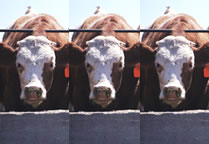"I could eat that every night!" -- The Cloning Issue

The FDA finally released their risk assessment about cloned animals today, and if you eat animals or any of their byproducts (like milk) you might want to hear this: They've been deemed safe for eating. This really isn't news -- it's been expected that the FDA would come to this conclusion for some time now, since the components of food from clones are largely the same as those from conventionally bred animals.
But.
No labeling. And some people just don't like the idea. Should they have a choice in the matter? Well, the FDA wants to know what you think about that and the matter in general and will be taking public comment for the next few months on the matter. You can do that here (though as of today it wasn't set up
 -- wait a few days perhaps). The docket number is 2003N-0573 if you want to paste that into the search on the link.
-- wait a few days perhaps). The docket number is 2003N-0573 if you want to paste that into the search on the link.My take on it: Clones do have problems. The fetuses die more often, and genetic expression can be off, causing a higher chance for the animal to die in the first 18 months. But surviving animals are direct genetic copies (the FDA likens it to twins delivered at different times). The animal may have problems, may be more susceptible to illness -- not a lot is known. These are expensive animals to breed and they are mostly used to promote desirable characteristics for breeding programs that produce conventional animals -- but when they outlive their usefulness, they might be on your dinner table.
When you eat food, your body denatures the proteins, and for good reason. Those proteins are foreign and were only of use to the food source. Your body needs to break food proteins down and rebuild them in ways that are usable to you. Dietary proteins are uncoiled by stomach acid and your digestive enzymes go to town, breaking them apart into individual amino acids. Your DNA then directs the rebuilding of amino acids into proteins for muscle, hair, nails, other DNA, hormones, organs, etc. Proteins you ingest include DNA from the food source itself, and you will probably be unaffected by that DNA, (though some proteins do pass through the digestive system without fully breaking down, hence the probably part). This is the reasoning behind the FDA's decision that the products of that animal, the meat, milk, etc. should be safe. Of course, you will still be susceptible to any diseases the animal might carry, etc.
But because scientists haven't fully explored the effects of cloning, I am for labeling such items. If they decide against it, marketers will be savvy enough to figure out what to do anyway: lots of GMO (genetically modified organisms) products are not labeled as such, but plenty of foods are labeled GMO-free for those looking to avoid them. I'm sure a Clone-Free beef sticker will find it's way onto the cellophane and a Clone-Free carton will bear your milk if it's perceived to be a problem.

0 Comments:
Post a Comment
<< Home